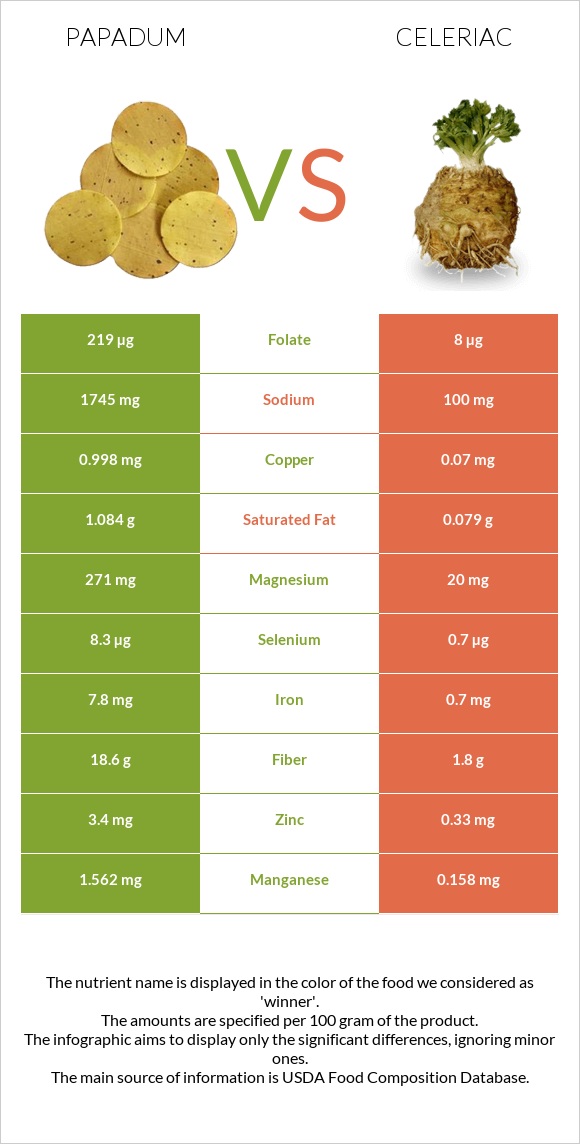Papadum vs. Celeriac — In-Depth Nutrition Comparison
Compare
Differences between papadum and celeriac
- Papadum is higher in copper, iron, fiber, manganese, magnesium, folate, phosphorus, and zinc; however, celeriac is richer in vitamin K.
- Papadum's daily need coverage for copper is 103% higher.
- Papadum has 27 times more folate than celeriac. While papadum has 219µg of folate, celeriac has only 8µg.
- Celeriac has less sodium.
- Celeriac has a lower glycemic index (35) than papadum (46).
The food types used in this comparison are Papad and Celeriac, raw.
Infographic

Infographic link
Mineral Comparison
Mineral comparison score is based on the number of minerals by which one or the other food is richer. The "coverage" charts below show how much of the daily needs can be covered by 300 grams of the food.
| Contains more MagnesiumMagnesium | +1255% |
| Contains more CalciumCalcium | +232.6% |
| Contains more PotassiumPotassium | +233.3% |
| Contains more IronIron | +1014.3% |
| Contains more CopperCopper | +1325.7% |
| Contains more ZincZinc | +930.3% |
| Contains more PhosphorusPhosphorus | +234.8% |
| Contains more ManganeseManganese | +888.6% |
| Contains more SeleniumSelenium | +1085.7% |
| Contains less SodiumSodium | -94.3% |
Vitamin Comparison
Vitamin comparison score is based on the number of vitamins by which one or the other food is richer. The "coverage" charts below show how much of the daily needs can be covered by 300 grams of the food.
| Contains more Vitamin AVitamin A | +∞% |
| Contains more Vitamin B1Vitamin B1 | +454% |
| Contains more Vitamin B2Vitamin B2 | +330% |
| Contains more Vitamin B3Vitamin B3 | +110.3% |
| Contains more Vitamin B5Vitamin B5 | +160.5% |
| Contains more Vitamin B6Vitamin B6 | +72.7% |
| Contains more FolateFolate | +2637.5% |
| Contains more Vitamin CVitamin C | +∞% |
| Contains more Vitamin EVitamin E | +620% |
| Contains more Vitamin KVitamin K | +10150% |
All nutrients comparison - raw data values
| Nutrient |  |
 |
DV% diff. |
| Copper | 0.998mg | 0.07mg | 103% |
| Iron | 7.8mg | 0.7mg | 89% |
| Sodium | 1745mg | 100mg | 72% |
| Fiber | 18.6g | 1.8g | 67% |
| Manganese | 1.562mg | 0.158mg | 61% |
| Magnesium | 271mg | 20mg | 60% |
| Folate | 219µg | 8µg | 53% |
| Protein | 25.56g | 1.5g | 48% |
| Phosphorus | 385mg | 115mg | 39% |
| Vitamin K | 0.4µg | 41µg | 34% |
| Zinc | 3.4mg | 0.33mg | 28% |
| Potassium | 1000mg | 300mg | 21% |
| Vitamin B1 | 0.277mg | 0.05mg | 19% |
| Carbs | 59.87g | 9.2g | 17% |
| Calories | 371kcal | 42kcal | 16% |
| Vitamin B2 | 0.258mg | 0.06mg | 15% |
| Selenium | 8.3µg | 0.7µg | 14% |
| Vitamin B5 | 0.917mg | 0.352mg | 11% |
| Calcium | 143mg | 43mg | 10% |
| Vitamin C | 0mg | 8mg | 9% |
| Vitamin B6 | 0.285mg | 0.165mg | 9% |
| Polyunsaturated fat | 1.148g | 0.148g | 7% |
| Fats | 3.25g | 0.3g | 5% |
| Vitamin B3 | 1.472mg | 0.7mg | 5% |
| Saturated fat | 1.084g | 0.079g | 5% |
| Vitamin E | 0.05mg | 0.36mg | 2% |
| Choline | 0.4mg | 9mg | 2% |
| Cholesterol | 4mg | 0mg | 1% |
| Vitamin A | 13µg | 0µg | 1% |
| Monounsaturated fat | 0.532g | 0.058g | 1% |
| Net carbs | 41.27g | 7.4g | N/A |
| Sugar | 0g | 1.6g | N/A |
| Tryptophan | 0.266mg | 0% | |
| Threonine | 0.886mg | 0% | |
| Isoleucine | 1.303mg | 0% | |
| Leucine | 2.115mg | 0% | |
| Lysine | 1.695mg | 0% | |
| Methionine | 0.372mg | 0% | |
| Phenylalanine | 1.491mg | 0% | |
| Valine | 1.434mg | 0% | |
| Histidine | 0.715mg | 0% |
Macronutrient Comparison
Macronutrient breakdown side-by-side comparison
| Contains more ProteinProtein | +1604% |
| Contains more FatsFats | +983.3% |
| Contains more CarbsCarbs | +550.8% |
| Contains more OtherOther | +683% |
| Contains more WaterWater | +2421.5% |
Fat Type Comparison
Fat type breakdown side-by-side comparison
| Contains more Mono. FatMonounsaturated fat | +817.2% |
| Contains more Poly. FatPolyunsaturated fat | +675.7% |
| Contains less Sat. FatSaturated fat | -92.7% |





